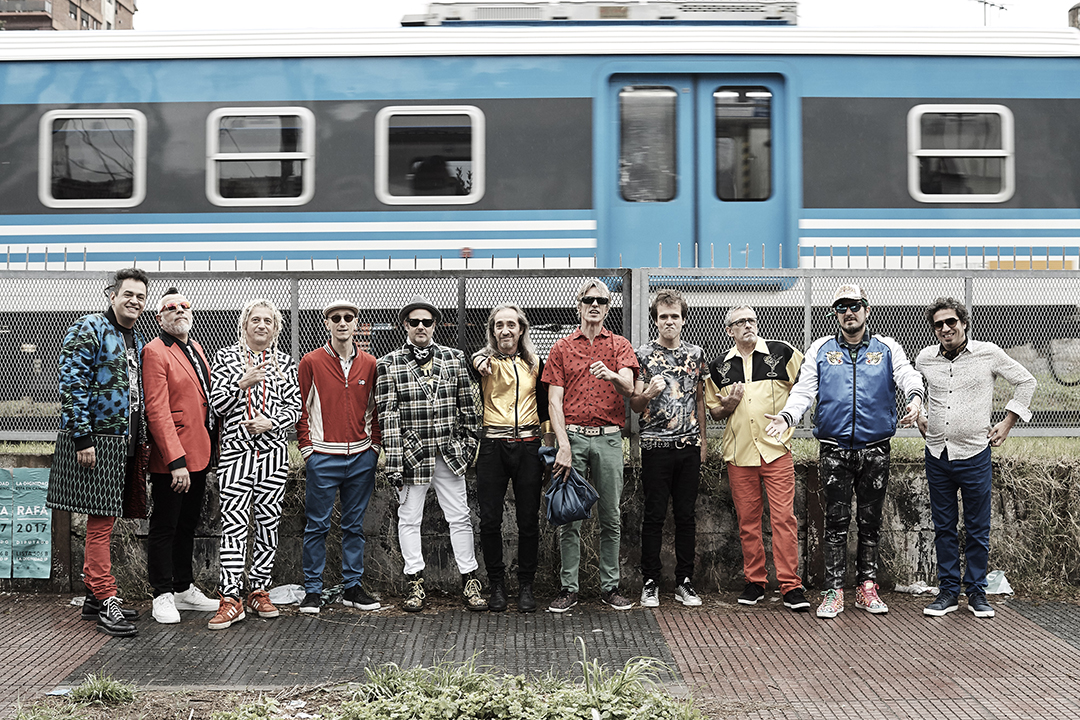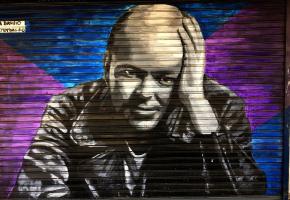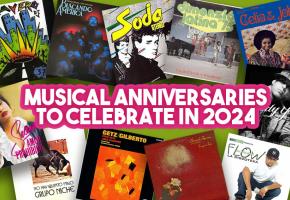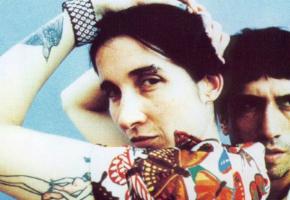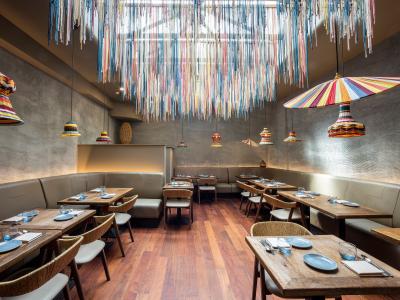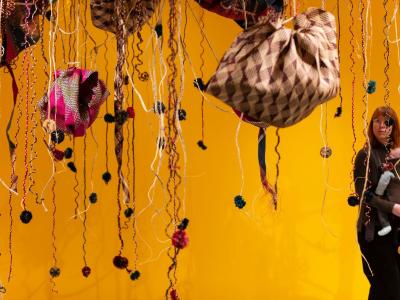It’s a strange paradox that, for many years, life was not easy for a band that made so people happy and made so many people dance. It’s as if the very characteristics that critics value today about Los Auténticos Decadentes (LAD) – the distinctive, anarchic energy that ensured a non-stop audience party - were the ones that prevented them from being taken seriously in the 1980s and 1990s.
Indeed, Argentine rock is not particularly known for making people dance. But finally the media succumbed and it is gratifying to Gustavo ‘Cucho’ Parisi and his crew with the same energy as ever, enjoying the great moment they are at right now: having recorded a MTV acoustic album last year, they’re touring the entire Americas and soon visiting London, while a Latin Grammy nomination is likely on its way.
As a fan, I get a real buzz, knowing that my interviewee Gastón ‘Francés’ Bernardou, played in the band’s very first show, in secondary school in San Martín (Greater Buenos Aires) in 1985, together with Nito Montecchia (guitars and choirs) and Cucho. I’m intrigued to know what he made Buenos Aires back them…
“It was really good to be in Buenos Aires then. Argentina had been for about 3 years in democracy by then and everything was really cool, free, and a lot of things were happening – as I suppose happens everywhere after a long period of dictatorship [1976-1983]. There were also a lot of bands. It was really nice. In Argentina all the new wave, dark and ska music arrived a bit late, with the new democracy…”
That sense of hedonism, and sharing that freedom with the audience, who would keep pogo-dancing nonstop until the end, were the hallmarks of LAD in the mid-1980s. Since then, they have brought in merengue, corridos, bolero, cumbia, bachata, forró, cuarteto, candombe and murga with Italian tarantela to the heady mix of Anglo ska, reggae, pop and psychedelia. They were mixing punk and cumbia when Latin American rythmns were not cool in Argentina, especially among the middle classes. Add to the mix its 12 band members, including up to 5 singers, 4 guitars, 4 percussionists and a 3-piece brass session, and the sensation of chaos was a given. At this point it is probably only fair to say that an imperturbable conviction, an uncompromising attitude, and a lot of work, kept them on course through the hard times. But a resilience spanning three decades keeps them not only going but going strong…
There were also some important bands at the time, I suggest
“Yes, Sumo was our flagship band, really. But there were also Soda Stereo and Virus with more modern influences. Our proposal was more based on ska, which was at the top around 1986 and 1987, when the Cadillacs started… So we appeared at the end of that period, also influenced by ska and mixing that with Latin American rhythms, especially cumbia.”
Of all the Argentina bands, however, I would argue that its less easy to hear to detect the British influences in LAD
“Well, we were definitely influenced by ska and by punk but we brought it together with music that was very popular in the Argentina’s ‘bailes’ and ‘bailantas’, where people go to dance! Later we started discovering bands that were doing similar things in other countries and were very surprised. They were different in style and in what they mixed. For instance, we heard Cafe Tacuba in Mexico making the bolero Maria, when we were doing ‘Loco (tu forma de ser)”, which we always treated as a bolero… Or Manu Chao and Mano Negra (France) were mixing Colombian music with the more electronic European sound. In the early 1990s there were a lot of musicians that rescued native rhythms and mixed them often with ska. In Mexico, like in Argentina, there was a lot of that. Los Fabulosos Cadillacs and Manu Chao opened a lot to doors that made things easier for us”
You were playing cumbia and murga, and even ballads, boleros at a time Argentine rock was not very open, was it?
“Yes, you’re right Argentine’s had this snobbery that sometimes prevented people from enjoying some tunes and rhythms that were really cool. Many people, at the beginning thought we were doing it ‘ironically’, as a joke… probably because we always prioritised the party, that people dance at our shows. We were always very obsessed with that, and obviously we did our search through the rhythms that we had at hand, starting with Alberto Castillo, the [precursors of cumbia in Argentina] Wawancó, and the later cumbia movement that became massive.”
LAD are perhaps the Latin American band that has got regularly more hits out of each of their albums. Examples of the late 1980s and 1990s are “Vení Raquel”, “Entregá el marrón”, “Loco (tu forma de ser)”, “Ya me da igual”, “La bebida, el juego, y las mujeres”, “Se va como la vida”, “Siga el baile” and “La marca de la gorra”. And that is only the beginning. Around 1995 LAD started to tour Latin America, and also to absorb folkloric rhythms from each of the places they visited. That year the album 'Mi vida loca' came out with another handful of hits: “La guitarra”, “El murguero”, “El pájaro vio el cielo y se voló”, “Diosa” and “Corazón”.
“We always loved Latin America and the folklore of the different countries and Mi vida loca, gave us a chance to tour and travel around. The songs did really well everywhere. But I should also say that for us touring was never easy. We’re a band with 12 members… if you add 8 members of support and technical staff, touring demanded a lot of effort. We put a lot into it because we really loved it!”
Towards the late 1990s “Los piratas”, “El gran señor” and “Cómo me voy a olvidar” started to hit the radios all around. Yet, the 2000s and beyond brought a few other hits such as “Besándote”, “Un osito de peluche de Taiwan” “No me importa el dinero”, “La prima lejana”, “Somos”, “Confundido” and “Y la banda sigue”…
One of LAD’s main assets through the years has been two exquisite songwriters such as Serrano and Diego Demarco (guitars). Both thrive in the simplicity of their lyrics and in an uncommon ability to establish an affective relation with the public through stories that strike always as familiar and comedic – a kind of extract of why life if worth living for (and laughing at). But also extrovert Cucho, Bernardou, Montecchia, Martín ‘La Moska’ Lorenzo (percussion), Mariano Franceschelli (drums) and Pablo Armesto (bass guitar) – to name some – appear regularly as composers.
Something that not many people know about LAD is the particular way they manage the band: they are a co-operative where all members earn the same and share equal responsibilities in the decision-making process. Even though composers earn more rights as songwriters, an importance percent of that always goes back to the band. While Cucho has been the most visible face of the band, everyone take on responsibilities for things they like doing or are good at, from management to coordination and music production, and from video-making and design to press and merchandising. Bernardou elaborates
“Jorge, Diego, Cucho or anyone else, on their own or in group, bring the songs and we listen to them or play them a bit… Say, we get probably 80 new songs (considering we’re 12!) and we then shortlist probably about 25 to 40 songs to which we give a chance. We rehearse those songs, make a demo and then we have to choose 10, 12 or 15 songs that will go into the album. We try to get songs we have all of us voted for. Depending on that we may have a shorter or longer album.”
In 2018 LAD’s MTV Unplugged Fiesta Nacional came out with acoustic versions of old hits and new songs. The album worked as a springboard with shows sold out in Santiago (Chile), the Auditorio Nacional in Mexico, Monterrey, Guadalajara (Mexico), Rosario and Córdoba (Argentina). After the shows in Spain and the UK, LAD will be playing a few shows in Buenos Aires and then the US (Miami, Washington, New York and Chicago).
“It was a lot of work,” says Bernardou “about six months of rehearsals plus three months with [the Argentine music producer] Gustavo Borner, working 10 hours a day. I think we’d never worked as much... [laughs]”
“From all points of view it was a really good experience. We are four percussionists (a drumkit, a timbal, someone in the bombo or güiro, and myself playing mostly congas). For the acoustic show we had a chance to play around and play other instruments. But above all, by removing the electric guitars and synthesisers, the percussion gained a lot of space, and it gave me a lot of pleasure because all the subtleties get often lost with the bigger electric sound.”
Whereas in the upcoming London show LAD will be playing the “electric” version, the shows in Latin America are currently going “acoustic”. I wonder why…
“The acoustic show demands a lot of work to put it together and set up, and we’re able to present it in only in some big cities. We have also a lot of guests. In Mexico, for instance, we played it only the main cities (including the Auditorio Nacional in Mexico city), but is very difficult to take it to smaller cities because of the high costs and the numbers of people that need to see it to make it viable.”
Before and after the London presentation in La Linea on Friday 3 May, LAD will be in Spain. They will start in SanSan Festival (Benicassim, 20 April) and ViñaRock (Villarrobledo, 2 May), before crossing the channel into the UK and back to the peninsula for shows in Alicante, Malaga, Zaragoza, Bilbao, Santiago de Compostela, Madrid and Barcelona.
Finally I ask about the show in London...
“We’re really looking forward to going back to Europe and to playing in London. Last year we were in Germany, and we loved to see Latin American migrants from different countries get together to go to see our show. And we expect to see the same in London. The show won’t be as intimate as the acoustic version we’re playing in Latin America, but all electric. People should expect the typical mix of our folklore with ska, reggae and other rhytms, and be ready to dance!
Los Autenticos Decadentes will play in Electric Brixton, Friday May 3, 9:00pm Tickets herehttps://www.comono.co.uk/live/los-autenticos-decadentes/


